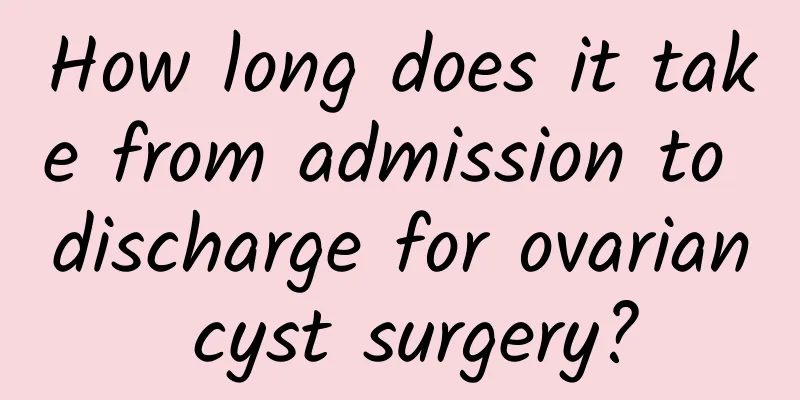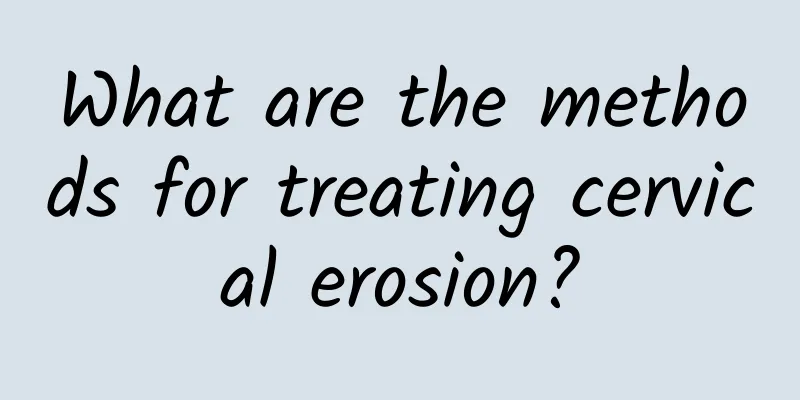How long does it take from admission to discharge for ovarian cyst surgery?

|
How long does it take from admission to discharge for ovarian cyst surgery? Generally speaking, you can be discharged from the hospital within 3-5 days. Ovarian cyst surgery is divided into open surgery and laparoscopic surgery, both of which require anesthesia and abdominal incision, so hospitalization care is required. If you recover well and there is no infection, you can usually be discharged from the hospital within 3-5 days. If there is an accident, please follow the doctor's advice. Causes 1. Genetic factors According to statistics, 20% to 25% of ovarian tumor patients have a family history. 2. Endocrine factors The ovary is an important organ for ovulation and secretion of gonadal hormones. Ovarian tumors mainly occur during the reproductive age. Clinically, the basic pathological and physiological changes of many patients with ovarian cysts and polycystic ovary syndrome are that the ovaries produce too much androgen. Excessive androgen is due to the abnormal synergistic effects of various endocrine system functions in the body. 3. Lifestyle factors Long-term poor diet structure, living habits, and excessive psychological stress may lead to physiological ovarian cysts and true ovarian tumors. 4. Environmental factors Food contamination, such as vegetable and other plant growth hormones, such as lean meat hormone ingredients in livestock and poultry and other formula feed. In recent years, with the improvement of living standards and changes in eating habits, as well as the abuse of hormone drugs and supplements such as breast enhancement, weight loss, and anti-aging by some young and middle-aged women, may also be related to the high incidence and younger trend of ovarian tumors. Clinical manifestations The biggest feature of a medium or lower abdominal mass, if there is no complication or malignant change, is mobility, which can usually be transferred from the pelvic cavity to the abdominal cavity. Malignancy or inflammation, limited swelling and tenderness, and even symptoms of peritoneal irritation and ascites. The diet should not be too greasy and high-cholesterol diet should be avoided, but high-protein intake is conducive to wound healing and recovery; second, an appropriate amount of fruits and vegetables, which are comprehensive in nutrition and rich in vitamins; third, do not eat foods that easily produce gas, which will cause abdominal distension and hinder recovery. Regular ultrasound examinations should be performed after surgery. |
<<: Reasons for delayed menstruation in women
>>: Be careful of the four hazards of cervicitis. How to prevent the recurrence of cervicitis
Recommend
How to treat uterine fibroids better? Surgical treatment of uterine fibroids
Uterine fibroids are a common gynecological disea...
What medicine should I take for adnexitis?
Adnexitis can usually be treated with medicines s...
Expert introduction: Symptoms of bacterial vaginosis
Generally speaking, it is difficult for patients ...
Dietary care for pelvic effusion
Among the many treatments for pelvic inflammatory...
Which hospital is good for treating cervical erosion?
Cervical erosion is a common disease in women. If...
Causes of irregular menstruation after induced abortion
Many female friends often experience irregular me...
What injection can prevent menstruation?
If you want to avoid menstruation by injection, y...
Learn about the symptoms of early cervicitis
The symptoms of early cervicitis are not easy to ...
Foot massage for health care and treatment of amenorrhea
[Introduction] Any woman who is over 18 years old...
What can I eat to delay menopause? Eat more foods high in protein
Menopause may make many women feel nervous and af...
What are the dangers of medical abortion? There are three major dangers
Medical abortion is generally for women with a re...
Can adnexitis heal on its own?
Adnexitis generally cannot heal on its own. Since...
Must you avoid eating starch to lose weight? Ella Chen breaks the myth of white rice and maintains a good figure without reducing sugar
In recent years, the concept of "reduced sug...
Female infertility is caused by uterine fibroids
Uterine fibroids are the most common benign tumor...
Women who have repeated abortions are more likely to have ectopic pregnancy
Women who have repeated abortions are more likely...









